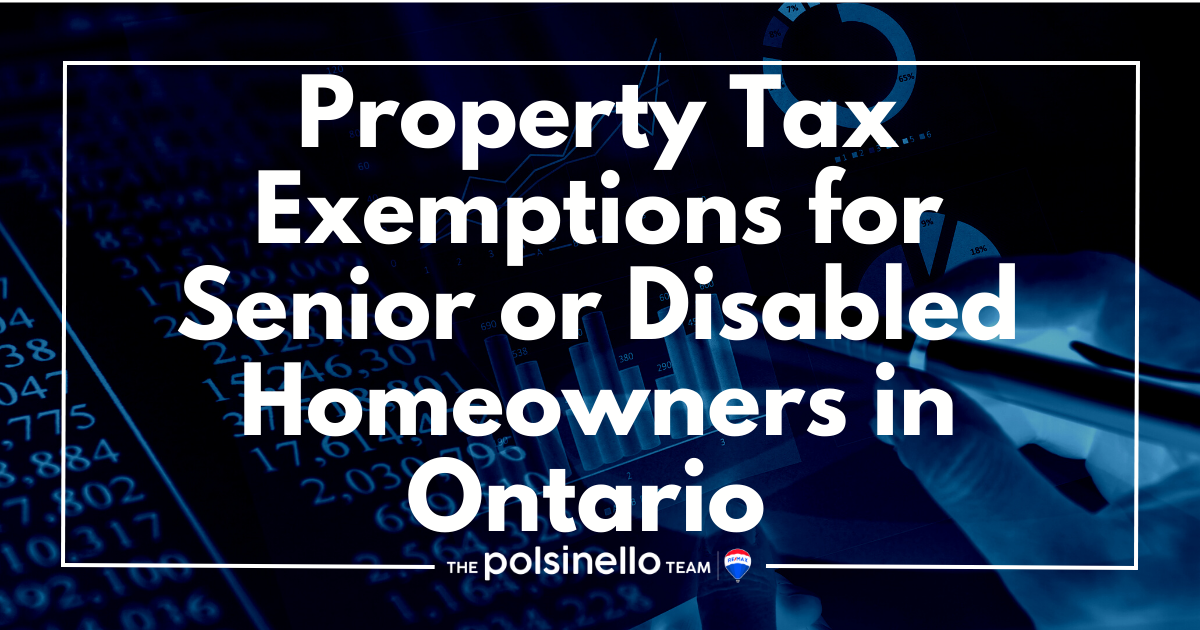
In Ontario, there are property tax exemption programs available for senior or disabled homeowners. These programs are designed to provide financial relief to those who are struggling to pay their property taxes.
Here are some links to programs in Aurora, Newmarket, East Gwillimbury and York Regions:
-
Aurora - Property Tax Rebate Program for Low-Income Seniors and Low-Income Persons with Disabilities: https://www.aurora.ca/en/home-and-property/resources/Documents/Seniors-and-Low-Income-Tax-Deferral-Program-2017.pdf
-
Newmarket - Tax Rebate Program for Low-Income Seniors and Low-Income Persons with Disabilities: https://www.newmarket.ca/TownGovernment/Pages/Budgets%20and%20Finances/Property%20Taxes/Property-Tax Rebates.aspx#:~:text=The%20Senior%20Tax%20Rebate%2C%20for,to%20each%20household%20per%20year.
-
East Gwillimbury - Property Tax Deferral Program for Low-Income Seniors and Low-Income Persons with Disabilities: https://www.eastgwillimbury.ca/en/municipal-services/tax-rebate-and-incentive-programs.aspx#:~:text=The%20Town%20of%20East%20Gwillimbury%20offers%20a%20Seniors%2C%20Low%2Dincome,or%20change%20of%20title%20occurs.
-
York Region - Property Tax Assistance for Low-Income Seniors and Low-Income Persons with Disabilities: https://www.york.ca/york-region/regional-property-taxes
It is important to note that eligibility criteria and application processes may vary depending on the municipality or region. Therefore, it is recommended to review the specific program details for each area to determine if you qualify and to learn how to apply.
-
Age: Typically, the minimum age requirement for seniors is 65 years or older.
-
Income: There may be income limits set for eligibility, which can vary depending on the program and location. Generally, the income limit is based on the total household income.
-
Property ownership: The property must be the primary residence of the homeowner and they must be listed on the property's title.
-
Disability: Some programs may require proof of a disability or a medical certificate.
-
Property tax payment history: The homeowner must be up to date with their property tax payments or have an approved payment plan.
It is important to note that each program may have its own specific criteria, and it is advisable to check with the relevant municipality or region for more information.
In addition to property tax exemption programs, there may be other financial assistance options available to seniors and disabled homeowners in Ontario. These may include grants, loans, or energy-efficient rebates. Again, it is recommended to check with the relevant municipality or region to determine what options may be available.
-
Ontario Renovates: This program provides financial assistance to low-income seniors and disabled homeowners for home repairs and modifications. The program can cover up to $5,000 for minor repairs and up to $20,000 for accessibility modifications.
-
Home and Vehicle Modification Program: This program provides funding for eligible homeowners and renters with disabilities to make home and vehicle modifications to improve accessibility and mobility.
-
Seniors' Home Safety Tax Credit: This tax credit is available to seniors who have made eligible renovations to their homes to improve safety and accessibility. The credit can be up to $1,500 per year.
-
Ontario Electricity Support Program: This program provides monthly bill credits to eligible low-income households to help with the cost of electricity. The credit amount depends on the household income and size.
Again, it is recommended to check with the relevant municipality or region to determine what financial assistance programs may be available for seniors and disabled homeowners in Ontario.
-
Ontario Seniors' Secretariat: This government agency provides information and resources for seniors, including information on housing, health care, and financial assistance.
-
The Canada Mortgage and Housing Corporation (CMHC): The CMHC provides information on home buying, home financing, and home renovation. They also offer programs and resources to help make housing more affordable for low-income individuals and families.
-
The Ontario Disability Support Program (ODSP): The ODSP provides financial assistance and support to people with disabilities in Ontario. They can help with housing, health care, and other living expenses.
-
The Ontario Association of Non-Profit Homes and Services for Seniors (OANHSS): This organization provides information and resources for non-profit housing providers and other organizations that serve seniors.
Overall, there are many resources and programs available to help seniors and disabled homeowners in Ontario with property taxes, home repairs and modifications, and other living expenses. It is important to research and explores these options to determine what assistance may be available and to seek help when needed.


Leave A Comment